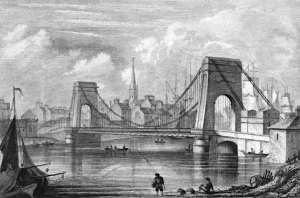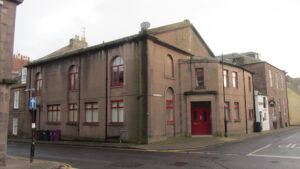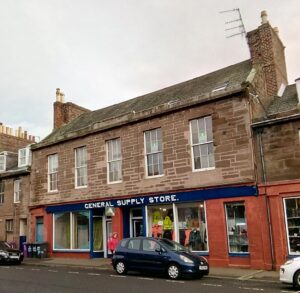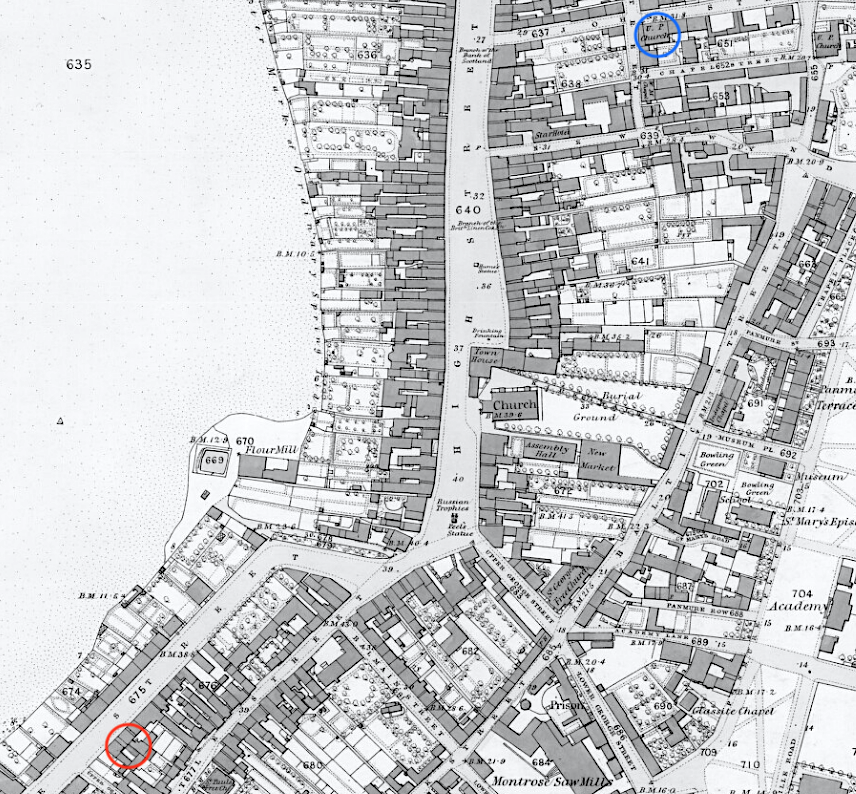
Some time after addressing the Scottish Temperance League meeting in Glasgow on 18 February, Frederick Douglass and James N. Buffum headed north again. Passing through towns they had already lectured in – Perth, Dundee, Arbroath – they spoke on three successive evenings in Montrose, beginning on Thursday 26 February.
A report of the first meeting appeared the following day in the Montrose Standard, specifying the United Secession Church of Henry Hyslop as the venue (marked blue on the map below).

From the report that appeared a week later, it is likely that the second meeting also took place there, while for the third the abolitionists moved to the Thistle Hall on Bridge Street (marked red).


We reproduce both reports below, followed by a third that appeared in the Montrose, Arbroath and Brechin Review. The reports are brief, and do not record Douglass’s speeches in detail. The newspapers seem to prefer to print the testimony of others, specifically a letter of recommendation from the Glasgow Emancipation Society, in order to respond to Douglass’s critics, rather than allowing him to speak for himself.
The reports suggest that the main subject of the speeches was (as the Standard put it) ‘the conduct of our Free Church friends, who have been accused – and we think justly – of lending their countenance to slavery, by accepting contributions from the slave states.’
But this was not the only thing on Douglass’s mind. On the day of his first meeting, he wrote an important letter to William Lloyd Garrison, editor of the Liberator, the abolionist newspaper in Boston, in which he fulfils his promise (made in a previous letter) to ‘say something more about Ireland’. And so, it was in Montrose that Douglass movingly wrote at length, for the first time, about the ‘extreme poverty and wretchedness of the poor’ he had observed in Dublin the previous autumn.1
AMERICAN SLAVERY. – Messrs Buffum and Douglas, the eloquent advocates for the abolition of slavery, delivered lectures last night, in Mr Hyslop’s chapel, to an overflowing audience. Mr Douglas (himself originally a slave) denounced the system in a very eloquent speech; and gave some explanations of his life and training as a young slave of his efforts to acquire a knowledge of reading and writing, unknown to his master, and of his treatment in the United States, as a liberated and educated negro. Mr Buffum also treated the subject in a masterly manner, but, from the late hour, we could not report at length either of their remarks. We believe they are to give another lecture this evening, when Mr Douglas purposes to bring the question ‘nearer home,’ – alluding, no doubt, to the conduct of our Free Church friends, who have been accused – and we think justly – of lending their countenance to slavery, by accepting contributions from the slave states. We shall resume the subject next week, when we shall be enabled to make a more full report. In the mean time, we would re commend those who abominate the horrid system of slavery, to lend their countenance and support to the present lectures..
Montrose Standard 27 February 1846
THE FREE CHURCH AND SLAVERY
In the latter half of last week, three public meetings were held to hear addresses on the subject of American slavery from Messrs. Douglass and Buffum – the former a runaway slave, and the latter a member of the American Anti-Slavery Society. The first two took place in the United Secession Church, and the latter in the Thistle Hall. The meetings were numerously and respectably attended, and the speakers handled their subject in such a way as to arouse the interest and excite the enthusiasm of their audience. Mr. Douglass’ present history is sufficient of itself to bespeak sympathy and curiosity; but, apart from any recommendation of this nature, his vigorous and impressive eloquence fits him admirably for an effective public speaker. His language is singularly chaste and elegant, notwithstanding the difficulties he has had to encounter in acquiring learning and information. His action is natural and forcible; and the tone of his voice imparts a strong impression to his words – whether he seeks to express deep feeling, playful irony, or sarcastic indignation. The incidents of his life would excite interest when learned under any circumstances, but to hear them related from his mouth, with all the advantages of his simple and burning eloquence, is a treat which it is not our fortune every day to enjoy. We are sure his return to this quarter on Monday next will be hailed with general satisfaction, and that an increasing interest will be taken in the cause which he so ably advocates.
Together with the general question of slavery, the two lecturers discussed the subject of the fellowship of the Free Church with the slaveholders of America. They invited any of the members of that Church to bring forward a defence of her conduct in this particular; but whether defence was considered somewhat difficult, or whether prudence suggested that ‘least said is soonest mended,’ no champion appeared to ward off the hard blows which were dealt to her with so much force and effect. An attempt, indeed, has been made to throw discredit upon their efforts, by representing them as unaccredited, and, perhaps, of questionable reputation, as if the facts and arguments they adduced required a name to recommend them to the hearts and consciences of men. Any effort, however, to damage the cause through its advocates will in this case be futile, as the following certificate from the Committee of the Glasgow Emancipation Society will very satisfactorily show.
At a meeting of the Committee of the Glasgow Emancipation Society, held 20th February, 1846, –
The attention of the Committee was called to certain statements made in speeches delivered by Free Church Ministers, at a late meeting of the Free Church Presbytery of Dundee, and subsequently circulated through the medium of the ‘Northern Warder’ and Edinburgh ‘Witness‘ – said statements being prejudicial to the influence and usefulness of our highly esteemed and valued friends and coadjutors, Messrs Henry C. Wright, Frederick Douglass, and James N. Buffum, from America, who are now labouring to array the moral and religious sentiment of the people of this country against receiving to Christian fellowship American slavehoders, and thus countenancing them in the practice of holding and using men as property. It was unanimously resolved,–
‘That the Secretaries of this Society be instructed to prepare a statement respecting these American friends and fellow-labourers in the Anti-Slavery cause; that the said document be signed by the Chairman, and by the secretaries, and a copy given to Messrs Wright, Douglass, and Buffum; also that copies be forwarded to the ‘Witness‘ and ‘Northern Warder,’ and other papers, for publication.’
In compliance with the foregoing instructions, we would say, that no distinct and detailed charges being made against these gentlemen, and no proof being brought to sustain the general assertions made respecting the circumstances, motives, and objects of their mission, we believe the following general statement may suffice –
We have, for years, been familiar with the names, labours, and characters of the above-named American friends, in connexion with the great Anti-Slavery struggle in their own country, through the medium of American newspapers – or private correspondence with American abolitionists – of the reports of American friends who have visited this country – and of our faithful, distinguished, long-tried, and well-known and universally respected coadjutor, George Thompson, Esq., who was intimately associated and acquainted with Messrs Wright and Buffum, while on his Anti-Slavery mission to the United States. Mr Douglass being at that time a slave, and held and used as ‘chattel personal,’ to all intents and purposes was, of course, unknown to Mr Thompson.
As to Mr Wright – who has laboured so assiduously and successfully during the past year, we call the attention of the people of Scotland to the insult and outrage done to Christianity and its Divine Author, by the efforts and leaders of the Free Church, to associate the name of Christian with that of slave-holder – he has been personally and intimately known to us, and to hundreds in this kingdom, for the last four years. We regard him as one of ourselves in the sacred cause of emancipation, and of promoting among men the Gospel spirit and principles of universal love and human brotherhood. His character as a man and a Christian – as a lecturer and writer on subjects of moral and Christian reform, are well-known to thousands both in this country and in America
Though not personally acquainted to the same extent with Messrs. Douglass and Buffum, yet so familiar are we with their names and labours, and with the names and efforts of those with whom they are associated in the cause of freedom in America, that we feel as if they, also, were our intimate friends. They come to us with all the recommendations which we could desire. We have every reason to believe that they are what they profess to be – sincere, honest, and self-sacrificing friends of the American bondmen, – labouring, by Christian means, to free them from their chains, and to redeem the Christian name from all connection with the foul system of slavery. We commend all three to the Christian and friendly regard of all who feel for the honour of our common Saviour, and the redemption of our common humanity from the degradation of American slavery, and sincerely hope they will countenance and further our friends in their philanthropic and Christian work.
Signed in name and by appointment of the Committee,
JAMES TURNER, Chairman.
JOHN MURRAY, WILLIAM SMEAL, SecretariesGlasgow, 27th Feb. 1846.
Montrose Standard, 6 March 1846
American Slavery. – For three successive nights last week, Messrs. Frederick Douglass and James M. [sic] Buffum, from the United States, addressed large and respectable audiences on the interesting subject of slavery, which still holds within its iron grasp no fewer than 3,000,000 of our fellow-creatures in ‘free’ America. Mr. Douglass was himself a slave only a few years ago; but his intelligence, conversational powers, and even eloquence, disprove the stigma that some would affix to the negro population, that they are of another and an inferior race. There are few people to me met with on the platform who appear to more advantage. The object of the party in visiting Britain is to stir up the benevolent to denounce the iniquitous system of trading in human flesh; and, accordingly, their addresses went to illustrate its awful enormity and wickedness, which one of their co-adjutors has summed up in these terms:
Slaves have no control over their offspring to train them up for God as rational, accountable beings, but are obliged to yield them up, as soon as they are born, to be reared as brutes for the market; they have no control over their own persons, and are robbed of the capacity to make anything their own; are incapable of being a party to a civil or criminal suit, and of being witnesses against their oppressors in civil or ecclesiastical courts; are liable to be seized, at any moment, and sold to pay their master’s debts; are forbidden, on pain of death, to attempt to change their condition, and to rise from brutes to men, from slaves to freemen; are transmitted from parents to children as goods; are denied the means of moral and intellectual improvement; are punished with stripes, imprisonment, and death, for acts which, in all others, are regarded as Christian virtues and duties; are bought and sold ‘like other live stock;’ are shut out from the comfort and hopes of redemption by Jesus Christ, as far as it is in the power of man to shut them out, and are compelled to live in absolute heathenism; the sole end of their existence is ‘the profit of the master;’ their powers of body and soul, their civil, social, and domestic rights and relations, their time and eternity, are all merged in the pecuniary interests of their owners. They are fed, clothed, reared, worked, disciplined, baptized, brought into the churches – taught that there is a God – a judgement to come – and an eternal state – to enhance their price in the market.
– On Saturday evening, Mr. Douglass informed his audience that a great change for the better, in regard to this important question, was passing over the free States of America – the subject could now be talked of, without the fear of being murdered. A great portion of all the addresses consisted of hits at the Free Church for receiving money from slaveholding States and Churches. A grand moral effect, the speakers contend, would be produced if the Free Assembly would ‘send back the money.’ It is not very flattering to the generality of their hearers to attach so much importance to any act on the part of the Free Church; but, nevertheless, the pell-melling at the Frees conduces greatly to keep the audiences merry. We believe both of the gentlemen have sincerely at heart the welfare of their fellow-countrymen; and we have pleasure in subjoining the following extract of a certificate in reference to them and Mr. Wright by the Glasgow Emancipation Society:
Though not personally acquainted to the same extent with Messrs. Douglass and Buffum, yet so familiar are we with their names and labours, and with the names and efforts of those with whom they are associated in the cause of freedom in America, that we feel as if they also were our intimate friends. They come to us with all the recommendations which we could deesire. We have every reason to believe that they are what they profess to be – sincere, honest, and self-sacrificing friends of the American bondsman, – labouring, by Christian means, to free them from their chains, and to redeem the Christian name from all connection with the foul system of slavery. We commend all three to the Christian and friendly regard of all who feel for the honour of our common Saviour, and the redemption of our common humanity from the degradation of American slavery, and sincerely hope they will countenance our friends in their philanthropic and Christian work.
Given in name and by appointment of the Committee.
JAMES TURNER, Chairman.
JOHN MURRAY, WILLIAM SMEAL, SecretariesGlasgow, February 27, 1846.
Montrose, Arbroath and Brechin Review, 6 March 1846
Notes
- Frederick Douglass to William Lloyd Garrison, Montrose, 26 February 1846 (Liberator, 27 March 1846); repr. in The Frederick Douglass Papers, Series Three: Correspondence, Volume 1: 1842–52, edited by John R. McKivigan (New Haven: Yale University Press, 2009), pp. 93–98.